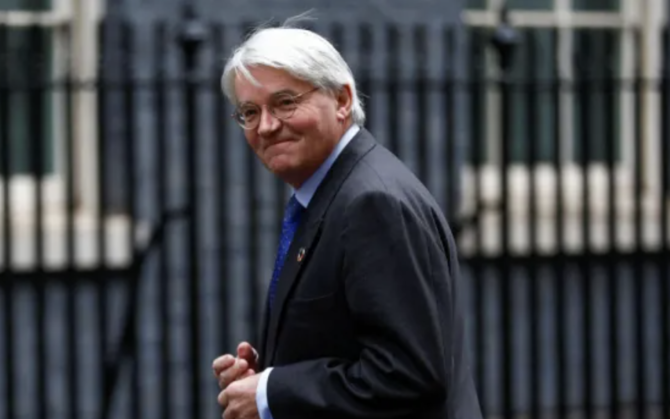Yossi Mekelberg
It is a rare occasion indeed when the source of the most critical verdict on a particular government policy is the minister in charge of the very policy that is found to be falling far short of what is desired and what the government previously committed itself to.
Andrew Mitchell, the British minister of state for development and Africa, whose responsibility is to maximize the benefits of the UK’s humanitarian aid — and who is known for not mincing his words — has published a report that reveals the devastating consequences of his own government’s deep cuts to its foreign aid budget.
Most worryingly, the report by the Foreign, Commonwealth and Development Office admits that the effects of reducing Official Development Assistance will be severe in all areas of development, but that the worst effects will be on programs for helping women and girls.
It was not so long ago that the UK was regarded as a global development powerhouse. Not any more. It was Conservative Prime Minister Rishi Sunak, during his time in charge of the country’s finances when he was chancellor of the exchequer, who reduced Britain’s spending on foreign aid, supposedly as a temporary measure, from 0.7 percent of gross national income to 0.5 percent. This cut represented a saving of about £4 billion ($5.1 billion) a year, which was supposedly to be used to mitigate the effects of the COVID-19 pandemic on the domestic economy.
The decision is perhaps understandable, given the pressure on the British economy as a result of the pandemic and the current cost-of-living crisis, but still it hardly justifies harming people whose very existence depends on funding for aid programs.
The cuts to British aid mean that since 2020 there have been significant reductions in the numbers of bilateral aid programs, which has hindered the objective of fostering greater equality. The analysis by Foreign Office civil servants reads like an unfolding horror show, in which deaths, devastation and loss of human potential are guaranteed.
For example, it seems the UK has, for all intents and purposes, given up on Afghanistan by cutting 76 percent of aid to the country. It is thereby abandoning some of the world’s most vulnerable women and girls, on whom the Taliban has imposed severe restrictions that violate their human rights “and (is) systematically erasing them from public spaces.” The cuts to UK aid now additionally leave them without access to critical services such as health services and education.
In Africa, it is feared thousands of women will die during pregnancy and childbirth as a direct result of the aid cuts, and 200,000 will face the prospect of unsafe abortions.
There is something unbearably flippant about decisions to cut foreign aid. After all, those who suffer as a result do not vote in the donor country’s elections, let alone register their views about government policies in opinion polls.
Reducing support for the most vulnerable is probably most popular among Conservative politicians and their supporters in the UK, second only to deporting asylum seekers to Rwanda or incarcerating them on floating detention barges.
But it is a shortsighted policy that lacks vision or any genuine plan; and not only in light of the obvious moral-ethical imperative to help those most in need. Reducing assistance to low-income countries only exacerbates their economic, social and political woes. This can only serve to further destabilize them, which in turn damages our own national interests, including security concerns and the prevention of radicalization. It also hinders our access to natural resources, reduces the chances to trade with economies that are growing instead of shrinking, and affects our ability to jointly address the challenges resulting from climate change and global health issues.
No wonder Sunak’s announcement of the cut in aid funding, made while he was serving in Boris Johnson’s government, was described by five former British prime ministers — John Major, Tony Blair, Gordon Brown, David Cameron and Theresa May, three of whom are Conservatives — as a “strategic mistake.”
A target for high-income countries to give at least 0.7 percent of their gross national income in aid was set by the UN General Assembly in 1970. More than 50 years later, only five countries — Sweden, Norway, Luxembourg, Denmark and the Netherlands — have consistently reached or exceeded this target. The UK achieved the milestone for the first time in 2013, under a statutory obligation to meet it.
It remains to be seen whether Sunak’s “temporary” measure, which the Treasury has said will be rescinded by 2028, will turn into a permanent one, although the Labour Party has promised to restore the 0.7 percent obligation upon what currently seems its likely return to power at the next general election, scheduled to be held by January 2025.
Although foreign aid to developing countries is not without negative side effects — and debates about whether or not it creates a culture of dependency, and the misuse of some of the funds leading to corruption, are not invalid — its overall contribution to the well being of both the donor country and the recipients is unquestionably invaluable.
If wealthier countries are serious about achieving all, or most, of the UN’s 17 Sustainable Development Goals — which include an end to poverty and hunger, the creation of jobs, ensuring health and well being for everybody, universal education, gender equality, and clean water and sanitation for all people — then foreign aid is an absolute necessity.
Most importantly, it should not be viewed as charity. In some cases, foreign aid comes with the stipulation that part of the money is spent in the donor country; this strengthens relations between the giver and the recipient but also helps to prevent political instability caused by radicalization and unwanted mass migrations, and the effects these have on donor countries.
Opposition to cuts in foreign aid does not mean ignoring the economic difficulties many developed countries are currently facing, or the domestic political implications that many politicians are too afraid to deal with for fear of frightening voters.
However, even when such cuts are temporary measures they nevertheless have immediate and devastating effects on vulnerable people, and it is impossible to simply start aid programs up again later at the point at which they were abandoned. Instead, many projects will be forced to start over from a worse position, among a more distrusting local population.
The Foreign Office analysis suggests that in Yemen, for example, the cuts to the UK aid budget mean half a million women and children will no longer receive healthcare, which in many cases will result in death. In South Sudan, the lives of tens of thousands of children suffering from severe acute malnutrition are at risk. Those who survive will miss out on essential vaccinations, which will leave a harmful long-term legacy.
It is inconceivable that out of an annual budget of nearly £1,200 billion, the UK government is unable to find the required sums for lifesaving humanitarian aid. This merely serves to further underline the fact that such policies are typical of a Conservative Party that habitually turns its back on those in the most dire straits, whether they are seeking asylum or need help in their home countries.
It is time for MPs with common sense and a strong moral compass, from all parties, to take a stand and rebel against Sunak’s xenophobic policies that are not only shaming the UK, a country that used to care about the less fortunate, but in the process are compromising the nation’s own interests.







